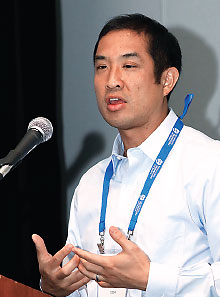Gambling disorder is the first non-substance-related addictive disorder to be included in DSM, but many practicing psychiatrists recognize that gambling is far from the only behavior that can become compulsive.
At APA’s 2019 Annual Meeting in May, a panel of psychiatrists who specialize in addictions discussed four other potentially addictive behaviors: internet use, sex, shopping, and videogaming. None is listed in DSM-5, though the condition of “internet gaming disorder” is in the appendix under “conditions for further study.” (Gaming disorder was added in the International Classification of Diseases, 11th Revision.)
The goal of the session was to help nonspecialists understand the biology of these problem behaviors, said session chair Timothy Fong, M.D., a professor of psychiatry at the University of California, Los Angeles (UCLA), and co-director of the UCLA Gambling Studies Program. This understanding can in turn lead to more effective diagnosis and treatment.
A key question about behavioral addictions is whether they are a type of substance use disorder or whether they fit better in another DSM category. For example, addictive shopping is similar in appearance to hoarding disorder—a type of obsessive-compulsive disorder, while an eating addiction bears striking similarity to binge-eating disorder. In the case of sex disorder, Shram Shulka, M.D., a psychiatrist at Walter Reed National Military Medical Center in Bethesda, Md., noted that many patients with sex-control problems had attachment problems in childhood. This has led to a theory that sex disorder might be a type of attachment disorder.
However, imaging studies indicate that people with sex and other behavioral addictions tend to have cue-related activity increases in regions of the brain known to be involved with motivation and reward, Shulka said. These activity changes are similar to what happens when someone with alcohol use disorder sees photos of drinks, supporting the idea that these behavioral addictions fit into the substance use disorder category.
Fong also highlighted the importance of reward in driving addictive shopping behavior. “This compulsive need to buy and collect could be confused with hoarding disorder, but there is a key difference,” he said. “People with hoarding disorder know they have a bad compulsion, whereas people with shopping disorder have this urge or thrill to buy stuff.”
Likewise, people who engage in addictive eating show more control over the foods they compulsively eat than do people who binge eat, said Robert Rymowicz, D.O., a psychiatry resident at the Rutgers New Jersey Medical School. For example, people with an eating addiction crave specific hedonic foods high in sugar and fat, whereas people who binge eat may be less discerning, he said. “This tendency to focus on foods like chocolate suggests that eating addiction might be better termed as ‘food addiction,’ ” Rymowicz added.
While much of the session noted the similarities between these five behavioral addictions and traditional substance use disorders, the panelists did offer one important difference: the goals of treatment.
“Unlike alcohol or drug treatment, abstinence is not a realistic goal,” said Meghan Quinn, M.D., a resident at the Uniformed Services University of the Health Sciences in Bethesda, Md. Therapists can’t ask someone to give up the internet, as an example. “We do need these behaviors in life,” she said. Rather, the panelists suggested that treatments focus on patient recovery and treating comorbidities (depression, insomnia, and other substance use are common) while promoting better self-awareness and self-care.
As with substance use disorders, psychotherapy such as cognitive-behavioral therapy or acceptance commitment therapy is an important component of behavioral addiction treatment, and peer support groups can be useful as well.
Medications are also an option. Fong cautioned that currently there is no consensus on pharmacotherapy for behavioral addictions, but there is some evidence for certain medications. Notably, naltrexone and bupropion—commonly used to treat alcohol use disorder, cigarette smoking, and obesity—are also effective for many of these behavioral addictions (further validating these disorders as substance use problems).
Other panelists noted data suggesting that selective serotonin reuptake inhibitors (SSRIs) might work in some cases (especially for sex disorder since SSRIs have libido-lowering effects), as may mood stabilizers or stimulants. ■

